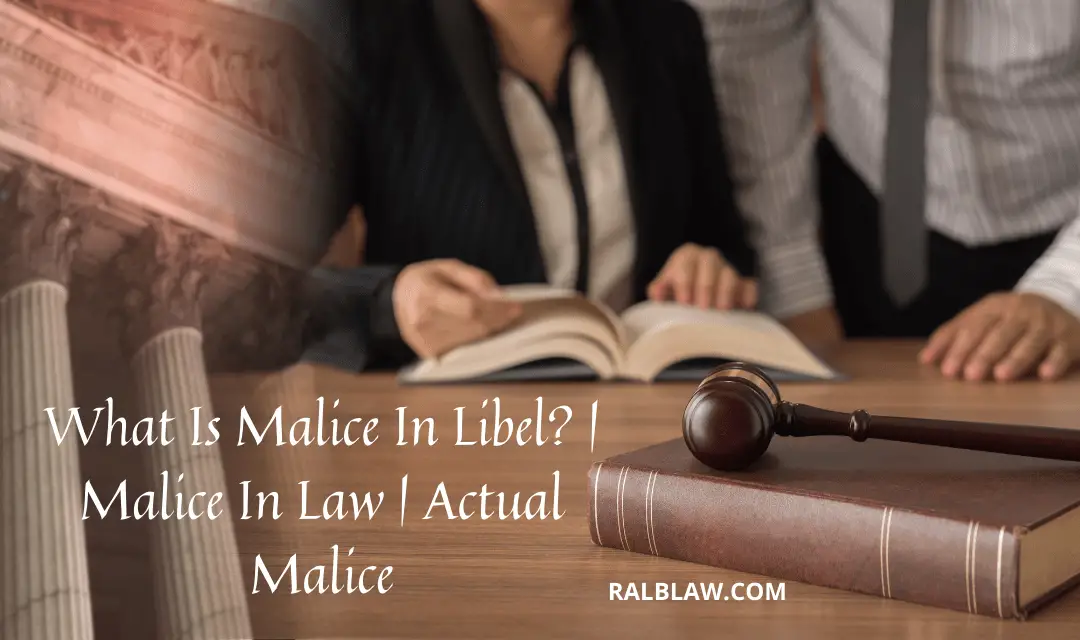Defamation of Character
Libel, in its layman and generic sense, is regarded as a form of defamation or derogation of certain individual’s character or being. The nature and consequences thereof are, in its essence, universal. It may be directed against one’s dignity, personality, condition, status, sex, and other similar characteristics or attributes. In every act of libel, there is malice. Thus, what is malice in defamation cases?
What is Malice in Libel?
First, we define libel:
A libel is public and malicious imputation of a crime, or of a vice or defect, real or imaginary, or any act, omission, condition, status, or circumstance tending to cause the dishonor, discredit, or contempt of a natural or juridical person, or to blacken the memory of one who is dead. 1.
Malice is the intentional doing of a wrongful act without just cause or excuse, with the intent to inflict an injury or under circumstances that the law will imply an evil intent. 2
Malice in libel, therefore, is the unwarranted, unjustified, and wrongful motive, intention, and objective of the author of a certain libelous remark to make known to third persons the supposed denigration of another individual, who is the subject of the libelous attacks.
There are two (2) kinds of malice that we shall discuss to help us understand one of the basic elements of libel and other forms of defamation. These are Malice in Law and Malice in Fact.
What is Malice?
Again, we would like to stress what is it. Consequently:
Malice is also a condition of mind which prompts a person to do a wrongful act willfully, that is, on purpose to the injury of another without justification or excuse. 3
And:
A conscious violation of the law (or the prompting of the mind to commit it) which operates to the prejudice of another person. 4
Also:
A condition of the mind showing a heart regardless of social duty and fatally bent on mischief. [Cockrell v. State, 135 Text.Cr.R. 218, 117 S.W.2d 1105, 1109, 1110] 5
As we can decipher from the above definition of malice, tested by jurisprudence, it may be briefly encapsulated as the intentional and conscious doing of a wrong, which has the net effect of injuring others.
Malice in Law or Presumed Malice
Malice in law is that kind of malice that the law presumes upon the commission of a certain intentional wrongdoing. It need not be proved by evidence or even cumulative proofs tending to establish the same, as the law steps in to state it as such.
In the Philippines, the High Court explained what is malice in law:
Malice in law is a presumption of law. It dispenses with the proof of malice when words that raise the presumption are shown to have been uttered. It is also known as constructive malice, legal malice, or implied malice. 6
In other states’ jurisdiction, it is relatedly defined as:
In libel case, it consists in intentionally publishing, without justifiable cause, any written or printed matter which is injurious to the character of another. [Becker v. Brinkop, 230 Mo.App. 871, 78 S.W.2d 538, 541]. 7
Necessarily, it is the tenor of the content that is basically the basis in determining whether the same is malicious or not. If such contents, statements, or other descriptions are derogatory or defamatory in character, even without probing on its truthfulness, much less proving the same, or the intention of the its proponent, malice is, thereby, presumed.
If a person is charged with the offense of Libel or Defamation in a criminal court, while presumption of innocence tilts in his favor, the contents or the utterances that he made are presumed to have been done with malice. Nonetheless, he can still overcome it by convincing proof that his content, statement, or description, when he made or uttered them, are justified, legal, and warranted under the circumstances, so as to overturn the presumption of law: malice in law.
If the proponent of the purported libelous or defamatory remarks was able to show justification, good faith, and privilege nature of the same, it will now be a question of actual malice and the determination whether or not it exists.
It will transpire after the respondent has successfully assailed the law’s presumption of malice against him. Failing in that regard, the presumption will stay until the conclusion of proceedings to be considered in the ensuing decision or judgment of the court.
Exceptions on the applicability of Presumed Malice [Malice in Law]
The Philippines’ very own Penal Code, distinctly categorizes this. Under Article 354 of the its Revised Penal Code 8, it provides that:
Art. 354. Requirement for publicity. — Every defamatory imputation is presumed to be malicious, even if it be true, if no good intention and justifiable motive for making it is shown, except in the following cases:
- A private communication made by any person to another in the performance of any legal, moral or social duty; and
- A fair and true report, made in good faith, without any comments or remarks, of any judicial, legislative or other official proceedings which are not of confidential nature, or of any statement, report or speech delivered in said proceedings, or of any other act performed by public officers in the exercise of their functions.
In the same manner under Article 361 of the same code, it states that:
Article 361. Proof of the truth. – In every criminal prosecution for libel, the truth may be given in evidence to the court and if it appears that the matter charged as libelous is true, and, moreover, that it was published with good motives and for justifiable ends, the defendants shall be acquitted.
It is worthy to note that the first part of the provision of the law [Article 354] speaks about the presumed malice, as we have discussed above.
Further down, the law now admits of exceptions from the rigid standards of Malice in Law. These are now the situations which require, in order to prosecute a person for libel, the establishment of Actual Malice.
Hence, even if the imputations appear to be defamatory, the same will not be presumed malicious if the same fall within the ambit of the following, to wit:
- Private [privilege] communication made in the performance of legal, moral and social duty
- Fair and true report of:
- any Judicial, Legislative, or other official proceedings which are not of confidential nature
- any statement, report or speech delivered in said proceedings
- any other act performed by public officers in the exercise of their functions
More importantly, under the mentioned Article 361, if the derogatory or defamatory statements become the subject of a criminal prosecution, proof thereof can still be a defense.
In this regard, while there is malice in law in every derogatory or defamatory acts or statements, still, the Philippine Law allows the defendant to present proofs in order to establish the truthfulness of the acts or statements.
Malice in Fact or Actual Malice
The Philippine Supreme Court, in the same case of Yuchengco 9, likewise, referred to the other malice, which is Malice in Fact or Actual Malice, categorically says that:
On the other hand, malice in fact is a positive desire and intention to annoy and injure. It may denote that the defendant was actuated by ill will or personal spite. It is also called express malice, actual malice, real malice, true malice, or particular malice.
In other jurisdictions, malice in fact is also called express malice. Thus:
Actual malice. Express malice, or malice in fact. [Eteenpain Co-op, Soc. v. Lillback, C.C.A. Mass., 18 F.2d 917]. In libel law, “actual malice” can be established by proving the publication was made with the knowledge of its falsity of its contents or with reckless disregard of whether it was false or not. [Hepps v. Philadelphia Newspapers, Inc., 506 Pa. 304, 485 A.2d 374, 389]. Such will be found where an intent to inflict harm through falsehood is established. [Cochran v. Indianapolis Newspapers, Inc., 175 Ind.App. 548, 372 N.E.2d 1211. 1219]. 10
Similarly:
Express malice or actual malice. Ill will towards a particular person; an actual intention to injure or defame such person. [Judge v. Rockford Memorial Hospital, 17 Ill.App.2d 365, 150 N.E.2d 202, 208]. 11
What is the difference between Malice in Law [Presumed Malice] and Malice in Fact [Express or Actual Malice]?
As discussed above, malice is consistent in its nature, characteristics, and essence, whether applied or considered as a presumed [malice in law] or actual [malice in fact] one.
The common denominator is that it is an intentional and unjustified wrongdoing tending to injure another.
Therefore, the profound distinction is the burden of proof. Meaning, he who has the burden of proof in proving or establishing malice on certain derogatory or defamatory statements.
If the statement is entitled to the application of Malice in Law in its favor, the burden of proof to establish the contrary rests on the one being accused of giving such statements.
On the other hand, if the statements belong to the class of privilege communication or the subject are official proceedings or public officials, then, as long as justified and a fair report at that bereft of personal ill-will [no matter how hurtful and hateful], the same must be proven by the complainant that they have been issued, given, or stated with malice.
In this instance, the person who will prove that such perceived defamatory accounts have been attended with malice, when done, is the complainant and not the defendant.
What are the kinds of defamatory cases?
One is Libel.
It is a defamatory remark, statement, or description in writing or printed on any canvass that is attributed and directed to certain individual. It has to be made known to third persons.
Another is Oral Defamation.
As differentiated from Libel per se, this one, while also a defamatory remark, is not printed or in writing. Oral Defamation 12 is done by uttering derogatory statements towards a certain person for the purpose of maligning him or her in public, with greater extent besmirching his or her reputation.
We have, as well, Slander By Deed.
They mainly differ in the manner of their respective executions. In the two previous defamatory acts, one is writing, and the other is uttering. On the other hand, Slander by Deed 13 is the physical act of defaming. For instance, slapping a person in front of the public for the purpose of degrading his or her dignity. Holding the breast of a woman in full view of by standers with the objective of shaming her.
The requirement of Publication
This simply means that the libelous remarks, defamatory utterances, or slander acts are made in public. It must have been witnessed, read, or heard by third persons, not necessarily the complainant or the injured party himself or herself.
Even if the injured party is not there when the utterances have been made or he or she does not have the occasion to read the libelous writings, publication is satisfied if the same came to the knowledge of third persons.
Publication as a requirement does not strictly contemplate announcement in a newspaper. It is only one medium of broadcast.
Is one allowed to utter or write defamatory remarks even if true against another individual?
In answering this, we must fist consider the objective of the author, the tenor of the remarks themselves, and the privilege nature of the same. We have to test if:
- the objective is justified, the proponent has no personal ill-will against the person to whom the statements are directed to, and it is not a personal and wrongful attack.
- the tenor itself, meaning the content and substance of the remarks i.e. malicious imputation of a crime, vice or defect, will it tend to cast dishonor, discredit, or contempt to the person to whom it is referred to, or to blacken the memory of the dead.
- the remarks are privilege and done in the performance of a legal, moral and social duty or it is a fair report of any public proceedings or any act of a public official.
If all of these are present, then the remarks, even if it will have the tendency to be, or the character of being, defamatory or derogatory, then it can be sustained as not being libelous per se.
The complainant now has the burden to prove that the remarks are malicious in nature, and the author is fueled by malice in making those purported derogatory statements.
These pronouncement of the High Court 14 of the Philippines is instructive, to wit:
The qualifiedly privileged communications are those which contain defamatory imputations but which are not actionable unless found to have been made without good intention or justifiable motive, and to which “private communications” and “fair and true report without any comments or remarks” belong. Since the qualifiedly privileged communications are the exceptions to the general rule, these require proof of actual malice in order that a defamatory imputation may be held actionable. But when malice in fact is proven, assertions and proofs that the libelous articles are qualifiedly privileged communications are futile, since being qualifiedly privileged communications merely prevents the presumption of malice from attaching to a defamatory imputation.
Lastly, proof of truth may be interposed as a defense, when actual malice is now being inquired into. 15
This is, of course, without prejudice to the tenor of the statement itself. If the same, analyzing its import, tends to besmirch, degrade, or defame a certain individual, the presumption will first arise [malice in law], subject to proof to the contrary when allowed by law, as in the above instances.
Hence, by saying this, we must be circumspective on every utterance that will come from our mouth or every post or article that we will write because, initially in the prosecution for libel or defamation cases, no matter what our intentions are, the tenor or import of the same will be the one that is tested first, and not whether the same is true or otherwise.
Libel and Social Media
In Republic Act No. 10175, otherwise known as the Cybercrime Law in the Philippines, it provides in its Chapter II [Punishable Offense], Section 4 the Cybercrime Offenses. One of which is Libel. Hence, in Section 4 (c) (4), it states that:
(4) Libel. — The unlawful or prohibited acts of libel as defined in Article 355 of the Revised Penal Code, as amended, committed through a computer system or any other similar means which may be devised in the future.
On the other hand, Article 355 of the Philippine Revised Penal Code provides that:
Article 355. Libel means by writings or similar means. – A libel committed by means of writing, printing, lithography, engraving, radio, phonograph, painting, theatrical exhibition, cinematographic exhibition, or any similar means, shall be punished by prision correccional in its minimum and medium periods or a fine ranging from 200 to 6,000 pesos, or both, in addition to the civil action which may be brought by the offended party.
Consequently, the above disquisition on libel and defamatory remarks and statements in connection with the nature, circumstance, consequences, and exceptions are likewise applicable in the cybercrime libel. The posts in social media are considered “in writing” or “printed”.
- Article 353 of the Philippine Revised Penal Code[↩]
- Black’s Law Dictionary, Sixth Edition, Henry C. Black, pp. 956[↩]
- Ibid.[↩]
- Ibid.[↩]
- Ibid.[↩]
- Yuchengco vs. Manila Chronicle Publishing Corporation, G.R. No. 184315, November 25, 2009[↩]
- Black’s Law Dictionary, Sixth Edition, Henry C. Black, pp. 957[↩]
- Act No. 3815, The Revised Penal Code of the Philippines[↩]
- Ibid. G.R. No. 184315, November 25, 2009[↩]
- Ibid. Black’s Law Dictionary, 6th ed., pp. 957[↩]
- Ibid.[↩]
- Article 358, Philippine Revised Penal Code[↩]
- Ibid. Article 359[↩]
- Manila Bulletin Publishing Corp. & Ruther Batuigas vs. Victor Domingo, July 5, 2017, G.R. No. 170341[↩]
- Article 361, Philippine Revised Penal Code[↩]




